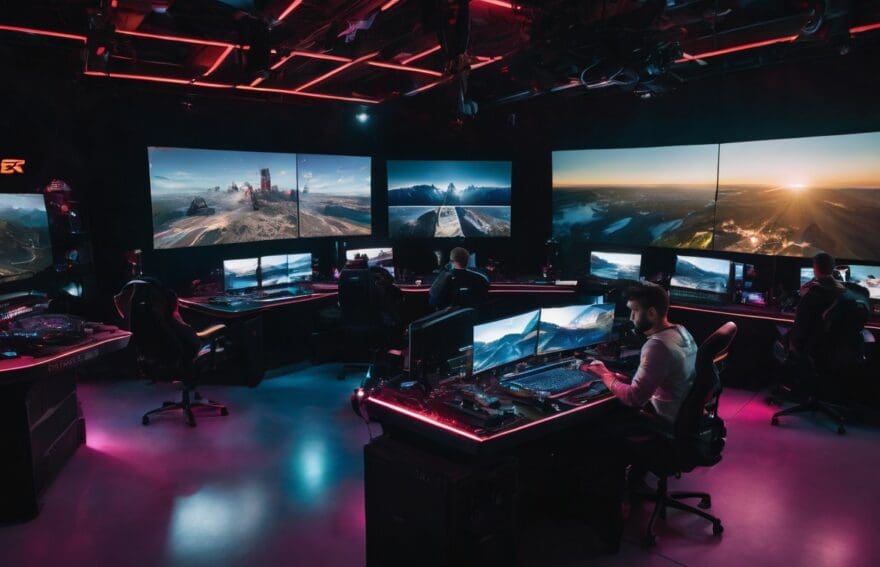The Legal Landscape of Esports: Rights and Regulations

Updated On: November 08, 2025 by Aaron Connolly
Are you a passionate gamer who wants to understand the legal rights and regulations surrounding esports? We’ve been there too, and we know how overwhelming it can be. Did you know that the FTC has implemented rules and regulations to ensure transparency and authenticity in endorsements and advertisements in esports? In this blog, we’ll dive into the complex world of legalities in esports and provide you with valuable insights to navigate this evolving landscape. Ready to level up your knowledge on esports law?
The rise of esports and its impact on the legal landscape
Esports have exploded in popularity, dramatically transforming the legal landscape as it surges. We’re seeing international regulatory bodies step in, much like with traditional sports, to guide this digital arena.
This new form of competition blurs lines between gaming and organised sport, creating fresh challenges for lawmakers and participants alike.
Governing copyright infringement becomes a hot topic as game developers hold property rights over their content. Organisers must tread carefully to avoid legal pitfalls. For us gamers and those venturing into the business side of esports, grasping these rights isn’t just smart—it’s critical for survival in this fast-paced world where creativity meets competition under watchful legal eyes.
As stakeholders wrestle with these issues, we witness an ever-shifting rulebook that demands our constant attention to play by the book and innovate responsibly within this electrifying domain of esports entrepreneurship.
Regulation of Esports
Creating a uniform regulatory framework for esports poses challenges due to the global nature of the industry and the varying legal standards in different jurisdictions. This makes it essential for stakeholders to work together to establish regulations that ensure fair competition and protect the rights of players, organisers, and investors.
Challenges in creating a uniform regulatory framework
Crafting a uniform regulatory framework for esports is no small feat. The industry spans across borders with diverse legal systems, which makes it tough to establish global standards.
Different countries have different rules about online gaming and sports law, creating a puzzle of regulations that players and organisers must navigate. Imagine trying to put together a jigsaw puzzle where each piece comes from a different box – that’s the challenge we face in aligning esports laws worldwide.
We often see complications due to variations in intellectual property rights enforcement. Game developers own their content, leading to copyright issues when events use their games without permission.
Additionally, with gambling regulation varying so much from place to place, setting consistent rules for betting on esports competitions becomes incredibly complex. As passionate gamers and budding industry professionals, we must stay informed and adapt quickly as the legal landscape shifts beneath our feet.
Contracts in Esports
Essential for the stability and success of esports, contracts play a crucial role in governing the relationships between players, teams, and organisers. From compensation to competition rules, these agreements ensure clarity and fairness in the industry.
Importance of contracts for players, teams, and organisers
Contracts play a pivotal role in esports, safeguarding the rights and obligations of players, teams, and event organisers. These agreements establish clear terms for sponsorship deals, player compensation, tournament participation, and intellectual property rights.
For instance, contracts outline endorsement rules to ensure transparency and authenticity in sponsored content. They also address the protection of copyrights and trademarks for gaming content creators.
As the legal landscape evolves alongside the booming industry of esports, understanding contract law is vital for all stakeholders.
Navigating through these contracts enables players to secure fair compensation while promoting their individual rights. Teams can effectively manage sponsorships and regulate player transfers with clear contractual frameworks in place.
Common clauses in esports contracts
Esports contracts commonly include clauses related to player compensation, team obligations, and tournament participation. These contracts outline the specific terms of payment for players, including salary, bonuses, and revenue sharing.
They also detail the responsibilities of both players and teams regarding practice schedules, promotional activities, and conflict resolution procedures. Moreover, tournament participation clauses cover aspects such as travel arrangements, accommodation provisions, and prize money distribution.
Understanding these clauses is crucial for players and teams to ensure fair treatment and clear expectations in their professional engagements.
Furthermore, esports contracts often feature non-compete agreements and intellectual property rights provisions. A non-compete clause restricts players from joining rival teams or engaging in similar activities that may conflict with their current team’s interests during or after the contract period.
Endorsements in Esports
Navigating the world of sponsored content in esports can be complex, with regulations from various bodies such as the FTC to ensure transparency and authenticity. It’s crucial for players, teams, and organisers to understand and adhere to these regulations when entering into endorsement deals.
Regulations for sponsored content
Esports regulations mandate transparency and authenticity in endorsements. The Federal Trade Commission (FTC) enforces rules to ensure that sponsored content is clearly labeled as such, protecting the rights of both content creators and audiences.
This means that in esports, sponsored posts and videos must be overt about their promotional nature, providing gamers with a clear understanding of what is an advertisement versus organic content.
Sponsorship agreements within esports must adhere to these regulations while also aligning with intellectual property rights protection. As the industry continues to grow, it’s crucial for stakeholders to comply with these rules to maintain trust and transparency among gamers and fans.
Ensuring transparency and authenticity
To ensure transparency and authenticity in esports endorsements, content creators must adhere to FTC regulations. This includes disclosing any sponsored content in a clear and conspicuous manner, allowing viewers to distinguish between promotional material and genuine opinions.
Additionally, the growing partnership between esports organisations and brands necessitates transparent sponsorship agreements that clearly outline the terms and compensation involved.
Ensuring authenticity in endorsements is crucial for maintaining trust with the audience. Content creator rights are protected through these measures, ensuring that both gamers and novice enthusiasts can engage with sponsored content confidently.
Intellectual Property in Esports
Protection of Intellectual Property is crucial in the world of esports, including copyrights, trademarks, and patents. Unauthorised use of content can lead to legal issues, making it essential for players and organisations to understand and protect their intellectual property rights.
Protection of copyrights, trademarks, and patents
Copyrights, trademarks, and patents are vital for safeguarding the creative and innovative works in esports. Game developers own the content of their games, so copyright protection is crucial to prevent unauthorised use by tournament organisers or others.
Esports organisations must also consider trademark protection to safeguard their logos, team names, and other brand elements from misappropriation. Additionally, obtaining patents for new technology or game mechanics can provide a competitive advantage and protect innovations within the industry.
As esports continues to grow rapidly, understanding these intellectual property rights becomes increasingly important for all stakeholders involved.
Potential issues with unauthorised use of content
Navigating the legal landscape of esports, we encounter potential issues stemming from unauthorised use of content. As the industry continues to grow, protecting intellectual property rights becomes increasingly crucial.
Unauthorized use of copyrighted material can lead to legal disputes between game developers and tournament organisers, potentially resulting in financial repercussions and damaged reputations for those involved.
Moreover, with the rapid evolution of gaming platforms and technologies, policing unauthorised use of content poses a significant challenge. It’s imperative that stakeholders establish clear guidelines and mechanisms to address copyright infringement swiftly and effectively.
Navigating the Legal Landscape of Esports Entrepreneurship
Understanding the legal aspects of esports is crucial for entrepreneurs looking to enter the industry. Collaboration among stakeholders is essential for promoting responsible gambling and fostering innovation in esports.
Importance of understanding legal aspects for entrepreneurs
Understanding the legal aspects of esports is crucial for entrepreneurs venturing into this industry. Intellectual property rights, contracts, and gaming regulations are all integral to navigating the legal landscape effectively.
Entrepreneurs need to be aware of the evolving regulatory framework and collaborate with stakeholders to ensure responsible gambling practices and foster innovation. This knowledge empowers entrepreneurs to protect their creative content, comply with sponsorship regulations, and establish a solid foundation for their ventures within the esports ecosystem.
As esports continues to gain attention from regulators and experiences rapid growth, it becomes increasingly important for entrepreneurs to stay informed about intellectual property rights, endorsements in sponsored content, and gaming regulations.
Collaboration among stakeholders for responsible gambling and innovation
Navigating the legal landscape of esports entrepreneurship is a complex task, and collaboration among stakeholders is crucial for responsible gambling and innovation. The growth of the gaming industry has necessitated evolving regulatory measures to address concerns related to gambling within the esports ecosystem.
As a result, it’s essential for stakeholders, including game developers, tournament organisers, and regulatory authorities, to collaborate effectively in setting guidelines that promote responsible gambling practices.
By working together, these parties can ensure a balanced approach that both protects players and fans while fostering innovation within the rapidly expanding esports sector.
Moreover, as the industry gains more attention from regulators and continues to evolve, collaboration among all stakeholders will be instrumental in navigating this challenging terrain.
Conclusion
Understanding the legal framework of esports is crucial for all stakeholders. Regulations and rights in esports are continuously evolving, requiring constant vigilance. As the industry grows, maintaining transparency and compliance with intellectual property laws becomes increasingly significant.
Navigating this landscape demands collaboration among all involved parties to ensure responsible entrepreneurship and innovation. Compliance with regulations is essential for sustainable growth and legitimacy in the world of esports.
FAQs
1. What are esports regulations?
Esports regulations are rules and guidelines that manage how video game competitions are conducted, ensuring fair play and protecting player rights within the esports industry.
2. Why is a legal framework important for esports?
A legal framework for esports helps to clearly define the laws and policies that govern these competitive events, including issues pertaining to patents in esports and the overall rights of participants.
3. Can players in esports have their own patents?
Yes, individuals involved in esports could potentially hold patents related to gaming strategies or innovative technologies used within the industry, providing them with legal protection and exclusive rights over their creations.
4. How does the legal landscape protect an esport player’s rights?
The legal landscape ensures esport players‘ rights by enforcing contracts, establishing guidelines around compensation, ensuring fair competition practices, and offering avenues for dispute resolution if conflicts arise.


